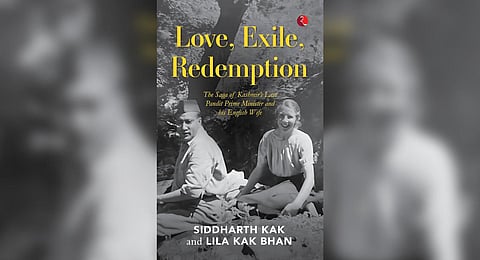

What exactly is the Kashmir problem? Did it start in 1931 or in October 1947? Why did the kingdom of Kashmir with a Muslim majority population refuse accession to either India or Pakistan, and preferred to stay neutral? How did they manage to maintain peace when most of the northern areas of the subcontinent were aflame due to Partition? Why was Nehru prevented from entering the kingdom by Maharaja Hari Singh in 1946? What are the four distinct provinces of the kingdom of Kashmir? What is the difference between the Muslim Conference and National Conference? These questions and much more are answered by the authors—Siddharth Kak and Lila Kak Bhan—as they trace the life of Ram Chandra Kak (RCK), the last Kashmiri Pandit prime minister in the book, Love, Exile, Redemption.
RCK or Bhaiji (respected brother), as the authors refer to him, was an archaeologist, who was appointed as the prime minister of the kingdom of Kashmir in 1945 by Hari Singh, only to be arrested by the same king because he resigned from the post two years later. Through his story, it sheds light on what the kings of the northern princely states of the subcontinent were planning in 1946. With the British Empire dissolving, the princely states planned to create the North Indian Empire of the subcontinent with its capital at Lahore and Hari Singh as its Emperor.
The ‘love’ that the title speaks of takes many forms through the book. There’s the love within RCK’s huge joint family, then there’s his love story with wife Margaret Mary Allcock, and of course, the Kashmiris’ love for Kashmir. The ‘exile’ part was undergone by mostly Lila Kak (RCK’s daughter) and her mother first in England until Bhaiji joined them two years later, then in Bombay, followed by Kasauli—a reflection of the larger exile of the Kashmiris away from their native land. The ‘redemption’ segment delves into the Kaks’ return to their homeland, and the journey of rebuilding and restoring their family homes.
Through the struggles of one family, the book successfully paints a vivid portrait of the history of the kingdom of Kashmir and its distinct people—the Sikhs, Hindus, Muslims, and the Rajputs, who were the clansmen of the king, but considered themselves above all Kashmiris. The narrative also offers a glimpse of the fascinating customs of Kashmiris and the communal harmony prevalent during that period. Take, for instance, the marriage norms. With child marriage still an accepted practice at the time, Kashmiri Hindu families often sent a Muslim woman to accompany their young married daughters to ensure that the latter didn’t feel alienated, exemplifying how the two communities lived together in the same household. Set in the backdrop of India’s fight against the British, prominent names from India’s freedom struggle—Mahatma Gandhi, Maulana Azad, Jawaharlal Nehru, Muhammad Ali Jinnah, Sardar Patel, Khan Abdul Ghaffar Khan—also dot the pages, even as Bhaiji’s life story is narrated in the forefront.
The storytelling is not linear though. It feels a tad jerky in the beginning despite the small notes at the bottom of each chapter about which of the two authors have penned it. It helps set the chronological context, but the disconnect prevails in noticeable chunks. The writing, however, has an almost poetic quality to it; it is gentle, sensitive, and meaningful. There is a sense of humour, love and a palpable pride for all things Kashmiri. Interspersed with letters, diary entries by Margaret, and portions from Bhaiji’s unpublished memoir, this is an important book, particularly because most Indians today are ignorant about RCK. Maybe, if this book was made compulsory reading for all Indians and Pakistanis, the history of Kashmir would be better understood.